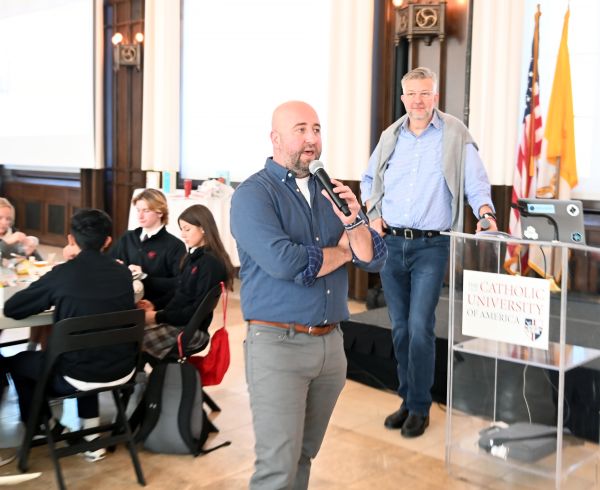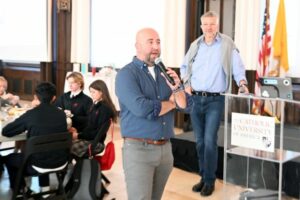CNA—When Luke Burgis moved to Silicon Valley to start a business, he never expected he would become a seminarian and then go on to launch entrepreneurship programs for Catholic students.
Burgis had attended NYU, worked on Wall Street, started several businesses in Silicon Valley, and moved to Las Vegas before deciding he wanted more meaning in his life. With the encouragement of a friend, he rekindled his Catholic faith. After five years in seminary, he ultimately discerned he would not become a priest, but he still found himself in need of deeper meaning in his work.
 So he founded Catholic Entrepreneurship and Design Experience (CEDE, pronounced “seed”) in 2020 to help students across the country connect their working lives with their faith.
So he founded Catholic Entrepreneurship and Design Experience (CEDE, pronounced “seed”) in 2020 to help students across the country connect their working lives with their faith.
Four years later, CEDE is a thriving organization based at Catholic University of America (CUA) in Washington, D.C., with programs and educational materials across the world. Burgis is the entrepreneur-in-residence and assistant clinical professor of business at CUA. He has developed educational materials shared with Catholic schools and home-school communities in addition to teaching business classes at CUA.
“I didn’t understand how I could actually live out my values and be a Catholic in the business world that I was in, even after I’d had that reconversion experience,” Burgis said when asked what inspired him to found CEDE.
“But I knew that there was some gap that we had to close in Catholic education between the theoretical or the principles of Catholic social teaching and the way that it actually plays out on the ground, if you’re trying to start something,” he explained. “We launched CEDE to try to reintegrate these disciplines.”
This year, Burgis is launching a new project for CEDE — a summer entrepreneurship program for high school students. The 10-week virtual Startup Venture Challenge will teach high schoolers how to start a business.
“CEDE introduces students to basic principles of entrepreneurship within the context of Catholic social teaching and helps them understand that ultimately they are the entrepreneurs of their own lives, whether they ever start a business or not,” Burgis said.
Nurturing creative problem-solving
“We’re trying to train young Catholics to think more like an entrepreneur, which means finding creative ways to solve problems or to see solutions where other people only see problems,” he said. “We think that that’s really important for all Catholics, period, and that if we had a more entrepreneurial Church, we would have a more adaptive and creative Church.”
[cautionary observation: personally, we at the Catholic Business Journal don’t understand exactly what Burgis means by “a more entrepreneurial Church” since the Catholic Church was founded by Christ Himself, who you might say is the ultimate entrepreneur. Not to mention Our Lord is certainly creative and a problem-solver. After all, He is one with the Creator of the Universe. Just sayin’—ed., Catholic Business Journal]
But being a “Catholic entrepreneur” isn’t necessarily about starting a business, Burgis noted.
“Our goal here is not really to create more business owners,” he explained. “Our goal is to help more young Catholics in Catholic schools be equipped and confident to go out into the world, whatever their vocation is.”
Burgis wanted to connect what he learned about business with Catholic teaching.
Experiential Learning
CEDE’s model of education is about “experiential learning,” “creative problem-solving,” and independence and “differs” from the rules-based form of education many American students are accustomed to, Burgis said.

Burgis said it will feel like “a challenge.”
“You’re being challenged, being given this mission,” he said. “We want to empower the students to accomplish that mission by working together and finding creative ways to solve problems on their own without being told how to do it. We actually want to make them a little uncomfortable.”
Students don’t need to have business ideas to join, as the first three weeks will be spent building up an idea. The full schedule involves a discernment stage, launching, testing, and then a resources and community stage.
“We want them to feel what it feels like to have a fire ignited within themselves, to exercise their own creativity, to take ownership of it, to take total responsibility, and to be proud of that, and to be able to serve others through their gifts and talents,” Burgis said.
The program runs from June 10 to Aug. 12 and is fully virtual and amenable to the students’ work schedules. The cost is $250, with scholarships available. Applications are open for teenagers ages 14–18.




You must be logged in to post a comment.